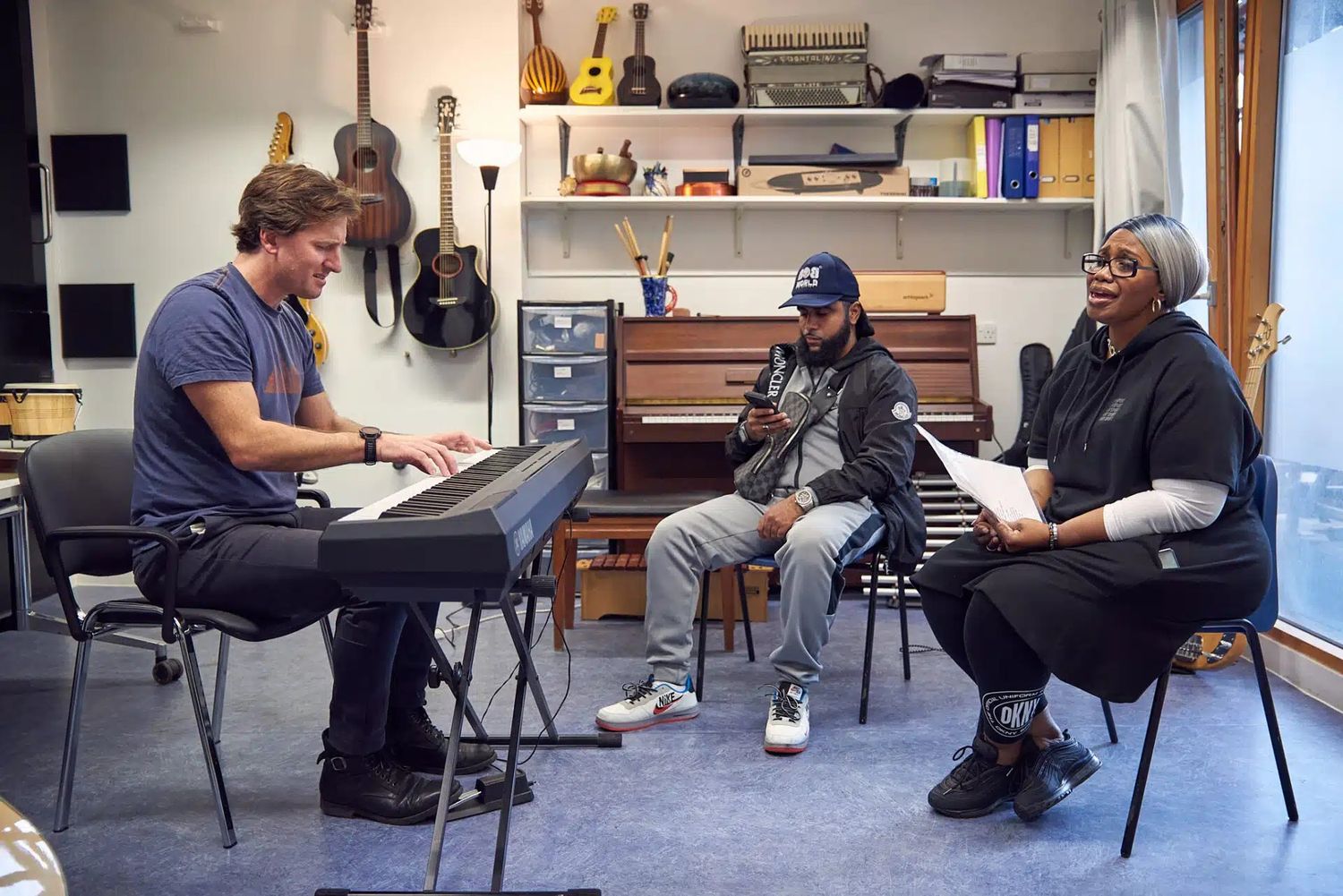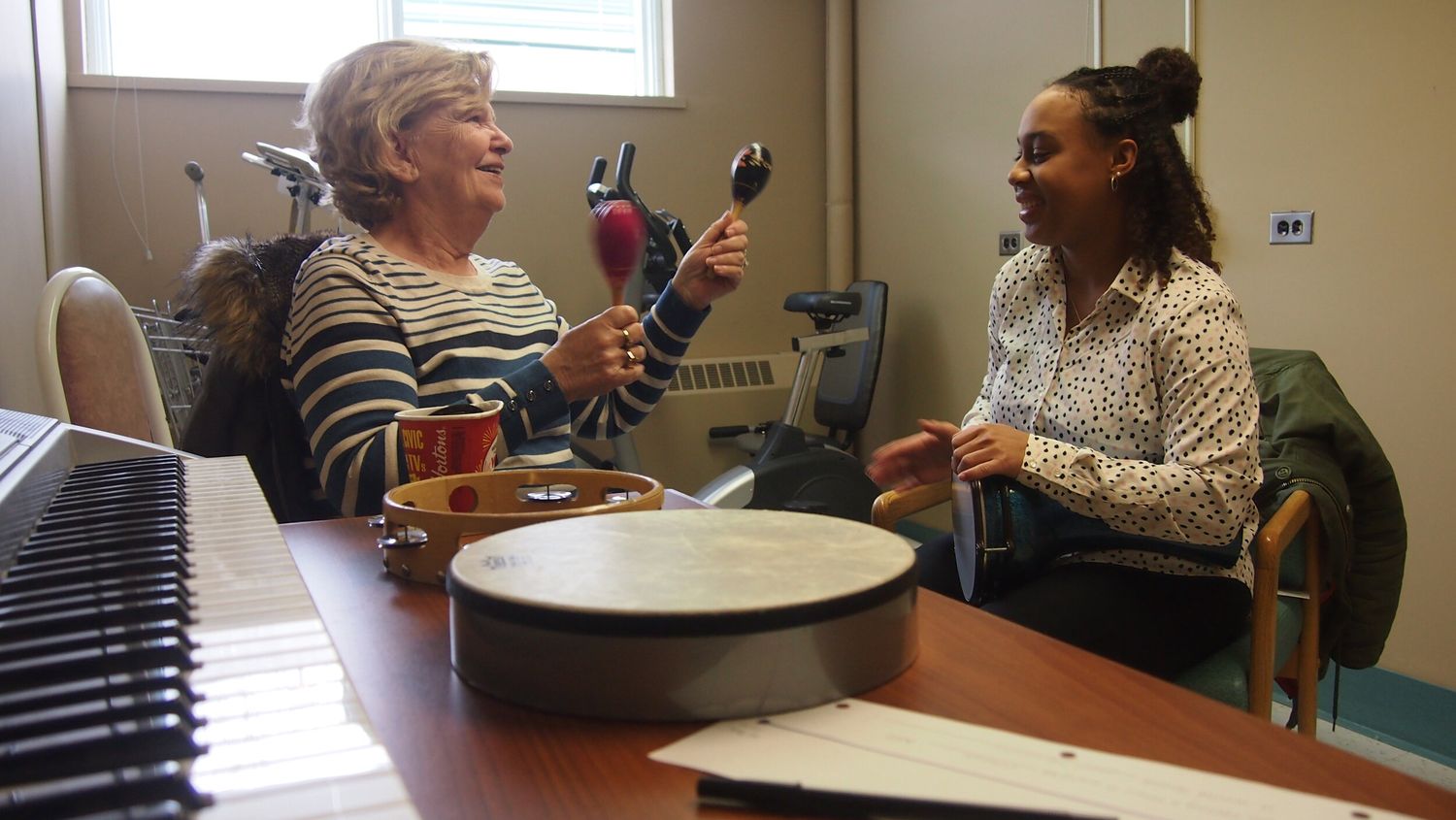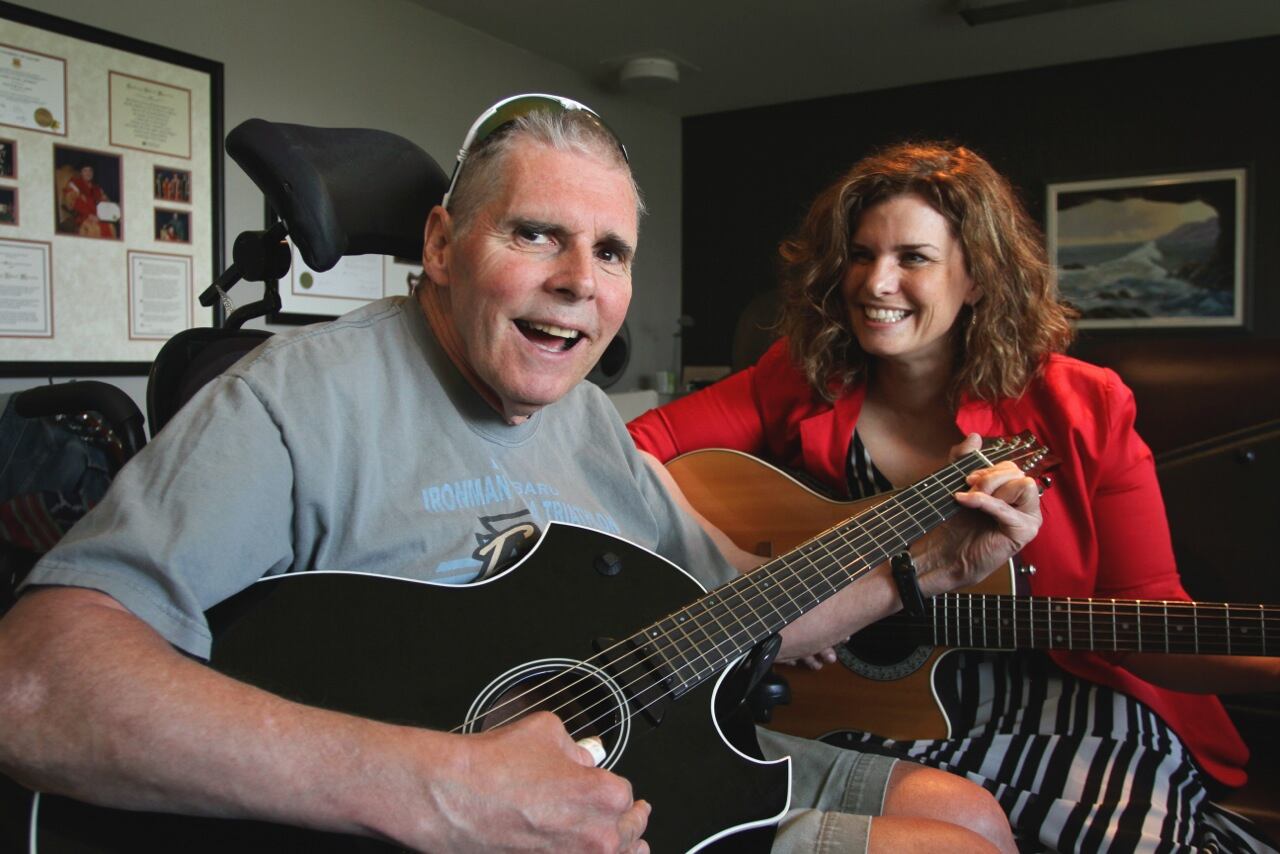Home>Events & Info>Music Therapy>What About Music Therapy Helps People


Music Therapy
What About Music Therapy Helps People
Published: February 1, 2024
Explore the powerful benefits of music therapy, improving mental health and well-being. Learn how music can positively impact people of all ages and backgrounds.
(Many of the links in this article redirect to a specific reviewed product. Your purchase of these products through affiliate links helps to generate commission for AudioLover.com, at no extra cost. Learn more)
Table of Contents
- Introduction
- What is music therapy?
- The benefits of music therapy
- Emotional healing through music
- Cognitive improvement through music therapy
- Physical benefits of music therapy
- Music therapy in mental health treatment
- Music therapy for patients with neurological disorders
- Addressing speech and language disorders through music therapy
- Music therapy for individuals with developmental disabilities
- Music therapy in palliative care
- Conclusion
Introduction
Music has an incredible power to touch our hearts, uplift our spirits, and evoke strong emotions. It has been an integral part of human culture for centuries, providing solace, inspiration, and a means of self-expression. However, music is not only a source of enjoyment; it can also be used as a therapeutic tool to promote healing and well-being. This is the essence of music therapy.
Music therapy is a professional practice that uses music as a medium to address the physical, emotional, cognitive, and social needs of individuals of all ages. It involves the relationship between a trained music therapist and a client, where the therapist uses music-based interventions to achieve specific goals and improve quality of life.
The benefits of music therapy can be experienced by anyone, regardless of their musical background or ability. Whether through listening to music, singing, playing instruments, or engaging in songwriting and improvisation, music therapy offers a unique and powerful form of therapy that transcends words and taps into the profound potential of music.
In the following sections, we will explore the various benefits of music therapy in detail. From emotional healing and cognitive improvement to physical well-being and its application in different fields, music therapy has a wide range of positive impacts on individuals.
What is music therapy?
At its core, music therapy is the use of music by a trained professional to address the physical, emotional, cognitive, and social needs of individuals. It is a holistic approach that recognizes the power of music to facilitate healing and personal growth.
Music therapists are skilled professionals who have completed a rigorous training program and are experienced in using music as a therapeutic tool. They work with individuals of all ages, from infants to the elderly, and tailor their interventions to meet each client’s unique needs and goals.
Music therapy sessions can take various forms depending on the client’s preferences and therapeutic goals. They may involve passive listening to music, active participation in music-making, or a combination of both. The therapist may guide the client in singing, playing instruments, composing songs, or engaging in musical improvisation.
During a music therapy session, the therapist establishes a therapeutic relationship with the client, creating a safe and supportive environment. Through music, they encourage self-expression, facilitate emotional release, and promote positive change.
Music therapy is different from music education or entertainment. While music education focuses on teaching musical skills and knowledge, and entertainment aims to provide enjoyment, music therapy has specific therapeutic goals in mind. It uses music intentionally and systematically to address physical, emotional, cognitive, or social needs.
The field of music therapy has gathered substantial evidence supporting its effectiveness. Scientific research has shown that music therapy can have a positive impact on mental health, physical well-being, cognitive function, and social interaction.
Overall, music therapy is a powerful and versatile therapeutic modality that harnesses the transformative power of music to improve the lives of individuals in various ways. It extends beyond traditional approaches and offers a creative and engaging pathway to healing and personal growth.
The benefits of music therapy
Music therapy offers a wide range of benefits across physical, emotional, cognitive, and social domains. Its inherent qualities, such as rhythm, melody, and harmony, can deeply impact individuals in profound ways. Let’s explore some of the key benefits of music therapy:
- Emotional healing: Music has the power to evoke and express emotions, providing a cathartic outlet for individuals. Music therapy helps individuals explore and process their emotions, reducing stress, anxiety, and depression. It can enhance self-awareness, promote emotional regulation, and improve overall emotional well-being.
- Cognitive improvement: Engaging with music stimulates various cognitive processes. Music therapy can improve attention, memory, and problem-solving skills. It has been shown to be beneficial for individuals with neurodegenerative disorders, such as Alzheimer’s disease, by enhancing cognitive function and slowing the progression of cognitive decline.
- Physical benefits: Music therapy can have a positive impact on physical health. Listening to music or participating in music-making activities can reduce pain perception, lower blood pressure, and improve respiratory function. It can also aid in physical rehabilitation by enhancing motor skills, coordination, and endurance.
- Social interaction: Music therapy provides opportunities for social connection and interpersonal engagement. It can improve communication skills, promote empathy, and foster a sense of belonging and community. Group music therapy sessions create a supportive and inclusive environment, encouraging individuals to interact and collaborate with others.
- Mental health support: Music therapy is widely used in mental health treatment. It can be an effective intervention for individuals with depression, anxiety, PTSD, and other mental health conditions. Through music, therapists can help individuals express their emotions, develop coping strategies, and improve overall psychological well-being.
- Neurological rehabilitation: Music therapy is particularly beneficial for individuals with neurological disorders, such as stroke or Parkinson’s disease. Research has shown that music engages neural networks in the brain, allowing individuals to regain movement, improve speech and language skills, and enhance overall neurological function.
- Developmental disabilities: Music therapy has shown significant benefits for individuals with developmental disabilities, including autism spectrum disorder and Down syndrome. It can improve communication, socialization, and cognitive skills. Music-based interventions provide a structured and engaging platform for learning and development.
- Palliative care: In palliative care settings, music therapy offers comfort, support, and emotional relief to individuals with life-limiting illnesses. It can alleviate pain and anxiety, enhance quality of life, and provide solace and connection during challenging times.
These are just a few of the many benefits that music therapy offers. The remarkable power of music transcends words, allowing individuals to experience healing, personal growth, and enhanced well-being. Whether used in hospitals, schools, rehabilitation centers, or private practice, music therapy offers a unique and effective approach to improving the lives of individuals in need.
Emotional healing through music
Music holds a remarkable ability to touch our emotions and evoke deep, profound feelings. It has been used as a source of comfort, self-expression, and healing for centuries. In music therapy, this power is harnessed to facilitate emotional healing and well-being.
One of the primary ways music therapy supports emotional healing is by providing a safe space for individuals to explore and express their emotions. Through musical improvisation, composition, or even passive listening, individuals can find a means of communication that goes beyond words. The therapist creates a non-judgmental environment where individuals can freely express their emotional states, allowing for a cathartic release of pent-up feelings.
Music therapy also utilizes the power of music to regulate emotions. Different types of music can elicit various emotional responses, and the therapist carefully selects and uses music to evoke or soothe specific emotions. For example, upbeat and energetic music may be used to uplift mood and increase motivation, while calming and soothing melodies can help individuals relax and reduce anxiety.
Engaging with music in a therapeutic setting can also enhance self-awareness and promote emotional insight. As individuals explore and create music, they can gain a deeper understanding of their emotional experiences, patterns, and triggers. This self-reflection, facilitated by the therapist, allows individuals to develop greater emotional intelligence and make positive changes in their lives.
Research has shown that music therapy can have a profound impact on emotional well-being. It has been found to reduce symptoms of depression and anxiety, improve self-esteem, and increase overall emotional resilience. In addition, music therapy has been used successfully in trauma-informed care, helping individuals process and heal from traumatic experiences.
Furthermore, music therapy can be particularly beneficial for individuals facing grief and loss. It can provide solace and support during times of profound sadness and help individuals navigate the complex emotions associated with loss. Through music, individuals can find comfort, express their grief, and find strength to move forward.
Overall, music therapy offers a unique and powerful approach to emotional healing. By harnessing the expressive qualities of music, therapists create a safe and supportive space for individuals to explore, process, and transform their emotions. Whether it’s finding solace in a familiar song, expressing oneself through musical improvisation, or using music to regulate emotions, music therapy provides a pathway to healing and emotional well-being.
Cognitive improvement through music therapy
Music has long been recognized for its impact on cognitive processes. It can stimulate various areas of the brain, enhancing memory, attention, problem-solving, and overall cognitive function. Music therapy harnesses these cognitive benefits to promote cognitive improvement in individuals of all ages.
One of the ways music therapy improves cognition is through the stimulation of memory recall. Music has a unique ability to evoke memories and emotions associated with specific events or periods in our lives. In individuals with cognitive impairments, such as those with Alzheimer’s disease or dementia, music therapy can tap into preserved musical memory, helping them reconnect with their past and enhance memory recall.
Engaging in music-making activities and musical exercises during music therapy sessions can also improve attention and concentration. Playing an instrument, singing, or participating in rhythmic activities requires focus, timing, and coordination, which can enhance cognitive functions associated with attention and executive skills.
Moreover, music therapy can stimulate neuroplasticity, the brain’s ability to reorganize and form new connections. Research has shown that engaging in musical activities can promote the growth of new neural pathways, particularly in areas associated with cognitive function. This neuroplasticity can lead to improved cognitive abilities, such as enhanced problem-solving, creative thinking, and cognitive flexibility.
Music therapy has also been shown to have a positive impact on language and communication skills. Singing and rhythmic speech can aid in language development, especially in individuals with speech and language disorders. The rhythm and melody of music provide a structured framework for individuals to practice speech and improve articulation, fluency, and word retrieval.
Furthermore, music therapy can be an effective intervention for individuals with neurodegenerative disorders, such as Parkinson’s disease. Studies have shown that rhythmic auditory stimulation improves motor function and coordination, allowing individuals to regain movement and improve gait patterns. This rhythmic synchronization between music and movement has a positive impact on cognitive processes related to motor planning and execution.
In educational settings, music therapy can support cognitive development in children. It can enhance concentration, memory, and academic performance. Learning through music engages multiple areas of the brain, making the learning experience more engaging and enjoyable.
Overall, music therapy offers a powerful tool for improving cognitive function. Through music-based activities and interventions, individuals can enhance memory, attention, problem-solving, language, and overall cognitive abilities. Whether used in rehabilitation settings, educational environments, or as part of neurodegenerative disease management, music therapy provides a creative and effective approach to unlocking cognitive potential.
Physical benefits of music therapy
Music has a profound impact on our bodies, and music therapy utilizes this influence to promote physical well-being. Engaging with music can have a range of positive effects on the body, spanning from pain reduction to improved motor skills. Let’s explore some of the physical benefits of music therapy.
One of the most well-known physical benefits of music therapy is pain management. Listening to music, especially calming and soothing melodies, has been shown to reduce the perception of pain. It can distract individuals from their discomfort, induce relaxation, and trigger the release of endorphins – the body’s natural pain-relieving hormones.
Additionallly, music therapy can have a positive impact on cardiovascular health. Listening to rhythmic music can synchronize the heartbeat with the tempo of the music, resulting in a more stable and efficient cardiovascular system. It can lower blood pressure, reduce heart rate, and improve overall cardiac function.
In terms of physical rehabilitation, music therapy can be a valuable tool. Engaging in music-making activities, such as playing instruments or rhythmic movements, can enhance motor skills, coordination, and balance. It provides a structured and motivating way to practice movements and rebuild physical abilities. This is particularly beneficial for individuals recovering from stroke, injuries, or neurological conditions.
Rhythmic auditory stimulation, a technique commonly used in music therapy, can also improve gait patterns in individuals with mobility impairments. Walking or moving to the beat of music can enhance the synchronization of movements, leading to more fluid and coordinated walking patterns. This can improve stride length, speed, and overall mobility.
Furthermore, music therapy can support respiratory function. Deep breathing exercises accompanied by slow and calming music can help individuals regulate their breathing, promote relaxation, and enhance lung capacity. This can be particularly beneficial for individuals with respiratory conditions, such as asthma or chronic obstructive pulmonary disease (COPD).
Music therapy can also be used in the field of weight management. Research suggests that the tempo and rhythm of music can influence eating behaviors and metabolism. Upbeat music can increase physical activity levels, while slow and calming music can promote relaxation and reduce stress-related eating. Music therapy can incorporate these principles to support individuals in adopting healthier lifestyle habits.
Overall, music therapy offers various physical benefits that can improve overall well-being. From pain reduction and cardiovascular health to motor skills and respiratory function, music therapy taps into the therapeutic potential of music to benefit the body. Whether it’s providing comfort, facilitating movement, or promoting physical rehabilitation, music therapy is a powerful ally in promoting physical health and vitality.
Music therapy in mental health treatment
Mental health is an essential aspect of our overall well-being, and music therapy has proven to be a valuable intervention in the field of mental health treatment. As a creative and expressive medium, music can provide a unique avenue for individuals to explore, process, and heal their mental and emotional challenges.
Music therapy is widely used to support individuals with various mental health disorders, including depression, anxiety, post-traumatic stress disorder (PTSD), and schizophrenia. One of the primary ways music therapy benefits mental health is by providing a non-verbal and non-threatening form of communication. It offers individuals an alternative means of expressing their emotions, experiences, and thoughts when words may be difficult to find or when verbal communication feels overwhelming.
Through the active engagement with music, individuals in therapy can experience emotional release, catharsis, and a sense of validation. Exploring emotions and engaging in musical activities can help individuals gain insight into their emotional patterns, develop coping strategies, and improve overall emotional resilience. Music therapy provides a safe and supportive environment for individuals to navigate their complex emotions and process their experiences in a therapeutic manner.
Listening to carefully selected music during music therapy sessions can also have a profound impact on mental well-being. Music has the power to evoke various emotions and moods. Therapists can choose music that matches the client’s emotional states – whether it be soothing and calming music to reduce anxiety or uplifting and empowering music to boost mood and motivation.
Moreover, music therapy promotes social interaction and a sense of connection, which are essential for mental health. Group music therapy sessions create an inclusive and supportive environment, allowing individuals to connect with others, share experiences, and develop social skills. Engaging in collaborative music making fosters teamwork, empathy, and communication.
Research has shown that music therapy can be effective in reducing symptoms of depression and anxiety, improving self-esteem, and enhancing overall psychological well-being. It has also been used successfully in trauma-informed care, helping individuals process and heal from traumatic experiences.
Music therapy is a versatile intervention that can be adapted to various mental health treatment settings. It can complement traditional talk therapy or be the primary therapeutic modality. The use of music in therapy adds a creative and engaging element to the therapeutic process, making it highly accessible and appealing for individuals of all ages and backgrounds.
Overall, music therapy offers a valuable pathway to supporting mental health. Whether it’s providing emotional release, promoting self-expression, enhancing social connection, or alleviating symptoms of mental health disorders, music therapy has the potential to positively impact the lives of individuals seeking mental health support.
Music therapy for patients with neurological disorders
Neurological disorders, such as Parkinson’s disease, stroke, and traumatic brain injury, can have a profound impact on individuals’ lives. Music therapy has emerged as a valuable intervention in the field of neurological rehabilitation, offering unique benefits for individuals with these conditions.
In patients with Parkinson’s disease, music therapy can improve motor function and coordination. Rhythmic auditory stimulation, a technique commonly used in music therapy, involves using music with a steady beat to guide movement. Individuals with Parkinson’s disease often experience movement difficulties and gait disturbances. By synchronizing their movements to the rhythmic beat of the music, they can improve motor planning and execution, resulting in more fluid and coordinated movements.
Music therapy has also shown promise in stroke rehabilitation. The rhythm and structure of music can improve motor recovery and aid in regaining lost functions. Music-based interventions, such as playing instruments or engaging in rhythmic movements, can activate neural pathways, stimulate neuroplasticity, and promote the relearning of motor skills. Additionally, music therapy can provide emotional support and motivation during the challenging journey of stroke recovery.
In individuals with traumatic brain injury (TBI), music therapy has been utilized to address cognitive, physical, and emotional challenges. Engaging in music-making activities can stimulate cognitive processes, such as attention, memory, and problem-solving skills. It can also aid in physical rehabilitation by improving motor function, coordination, and balance. Moreover, music therapy can provide a creative and expressive outlet for emotional processing, helping individuals navigate the emotional complexities often associated with TBI.
Music therapy can also benefit individuals with other neurological conditions, such as multiple sclerosis and Huntington’s disease. It offers an enjoyable and engaging way to exercise and maintain physical function. Music can help individuals manage pain, reduce anxiety, and improve overall well-being. Additionally, music therapy can provide a sense of social connection and support for individuals coping with these conditions.
Research has shown that music therapy can have positive effects on neurological function and overall quality of life. It can enhance cognitive abilities, aid in motor recovery, promote emotional well-being, and improve social interaction. Due to its multi-dimensional nature, music therapy addresses various aspects of neurological disorders, providing a holistic approach to rehabilitation and support.
Music therapists work closely with individuals affected by neurological disorders, tailoring interventions to their specific needs and goals. They incorporate music in a way that harnesses the brain’s inherent musical processing abilities, stimulating neural networks to promote optimal functioning.
Overall, music therapy offers a powerful and versatile approach in the realm of neurological rehabilitation. By harnessing the therapeutic power of music, individuals with neurological disorders can experience improvements in motor skills, cognition, emotional well-being, and overall quality of life.
Addressing speech and language disorders through music therapy
Speech and language disorders can greatly impact individuals’ ability to communicate effectively. Music therapy has emerged as a valuable intervention for addressing these challenges, offering a unique and engaging approach to improving speech and language skills.
Music therapy utilizes the rhythmic and melodic elements of music to enhance speech and language development. The inherent structure and repetition in music can provide a framework for individuals to practice and improve their communication skills.
Singing has proven to be an effective tool in addressing speech and language disorders. The rhythmic and melodic nature of singing stimulates various areas of the brain involved in language processing. Singing engages the breath support and vocal muscles, promoting articulation and clarity of speech. It can help individuals with speech disorders improve their vocal control, timing, and pronunciation.
In addition to singing, music therapy incorporates other musical elements to address specific speech and language goals. Rhythmic cues can enhance the rhythm and fluency of speech, aiding individuals with fluency disorders, such as stuttering. Instrumental activities, such as playing drums or percussive instruments, can improve oral motor skills and coordination, supporting clear speech production.
Songwriting and lyric analysis are also integral parts of music therapy for speech and language disorders. Creating lyrics and composing songs allows individuals to practice language skills, such as word retrieval, sentence structure, and storytelling. Analyzing the lyrics of familiar songs can increase comprehension and vocabulary, while also fostering self-expression and creativity.
Music therapy addresses the social and emotional aspects of communication as well. Group music therapy sessions provide opportunities for individuals to interact with others, practice conversation skills, and develop social communication strategies. Collaborative music-making activities encourage turn-taking, active listening, and non-verbal communication, promoting social connection and engagement.
Research has demonstrated the effectiveness of music therapy in improving speech and language skills in individuals with a range of speech and language disorders, including developmental delays, aphasia, and autism spectrum disorder. Music therapy provides a motivating and engaging environment that encourages active participation, making it particularly beneficial for children and individuals who may struggle with traditional speech therapy approaches.
Music therapists work closely with individuals affected by speech and language disorders, tailoring interventions to their specific needs and goals. They employ a combination of evidence-based techniques, individualized strategies, and the inherent therapeutic elements of music to support speech and language development.
Overall, music therapy offers a dynamic and effective approach to addressing speech and language disorders. By leveraging the rhythmic, melodic, and social aspects of music, individuals can improve vocal control, enhance speech production, expand language skills, and develop more effective communication abilities.
Music therapy for individuals with developmental disabilities
Music therapy is widely recognized as a powerful tool for supporting individuals with developmental disabilities. The unique qualities of music make it an effective medium for addressing physical, emotional, cognitive, and social needs. Through engaging musical activities, individuals with developmental disabilities can experience personal growth, enhanced communication, and improved overall well-being.
Music therapy provides a structured and enjoyable environment for individuals with developmental disabilities to explore and express themselves. It can help improve social interaction and communication skills by engaging individuals in musical improvisation, singing, and playing instruments together. Through these collaborative activities, individuals with developmental disabilities can practice turn-taking, listening, and non-verbal communication, fostering social connection and interpersonal skills.
In addition to social benefits, music therapy can support cognitive development in individuals with developmental disabilities. Engaging with music stimulates various cognitive processes, including attention, memory, and problem-solving skills. Music-based interventions can enhance cognitive abilities, promote academic learning, and improve overall cognitive functioning.
Music therapy also provides a means for emotional expression and regulation. Music has the power to evoke and express emotions, offering individuals with developmental disabilities a safe outlet for self-expression and emotional healing. Through musical activities and guided interventions, music therapists help individuals develop emotional awareness, regulation strategies, and a sense of empowerment.
For individuals with autism spectrum disorder (ASD), music therapy has shown significant benefits. The structured and predictable nature of music can help individuals with ASD feel more comfortable and engaged. Music therapy can improve social skills, emotional understanding, and sensory integration in individuals with ASD. It provides a means of communication and self-expression when verbal skills may be limited.
Music therapy is also effective in addressing the unique challenges faced by individuals with intellectual disabilities. It can promote cognitive development, improve motor skills, and enhance overall quality of life. Engaging in music-making activities such as playing instruments or rhythmic movements can boost confidence, self-esteem, and a sense of accomplishment.
Music therapists work closely with individuals with developmental disabilities, tailoring interventions to their specific needs and strengths. They incorporate various musical techniques, adaptations, and individualized strategies to address specific goals and promote progress over time.
The effectiveness of music therapy in supporting individuals with developmental disabilities is well-documented through research and clinical practice. By embracing the power of music, individuals with developmental disabilities can experience personal growth, improved communication, enhanced cognitive abilities, and a greater sense of well-being.
Music therapy in palliative care
Palliative care focuses on providing comfort, support, and quality of life to individuals facing life-limiting illnesses. Within this interdisciplinary approach to care, music therapy has emerged as a valuable intervention that offers solace, connection, and emotional relief to patients and their loved ones.
Music therapy plays an essential role in addressing the physical, emotional, and spiritual needs of individuals in palliative care. It provides a means of expression and a source of comfort during challenging times. Music therapists use carefully selected music, personalized playlists, live music, and improvisation to create a therapeutic environment that supports the unique needs of each patient.
One of the primary benefits of music therapy in palliative care is its ability to reduce physical and emotional pain. Music has the power to induce relaxation, promote emotional release, and distract individuals from physical discomfort. It stimulates the release of endorphins – the body’s natural pain-relieving hormones – providing relief and enhancing overall well-being.
Music therapy also offers emotional support and validation to patients in palliative care. Through music, patients can express their feelings, fears, and hopes when words may be difficult to find. Music therapists create a safe and non-judgmental space for patients to share their experiences and process their emotions, providing a sense of comfort and empowerment.
Moreover, music therapy fosters a sense of connection and social support. Group music therapy sessions can bring patients and their loved ones together, creating a shared experience that promotes bonding and emotional closeness. Music connects individuals on a deeper level, transcending words and fostering a sense of community and understanding.
For individuals at the end of life, music therapy can provide a source of solace and spiritual support. Music has a transformative quality that can evoke memories, provide moments of reflection, and bring peace to both patients and their families. It can bring comfort and a sense of presence, even as patients navigate their final journeys.
Research has shown the numerous benefits of music therapy in palliative care. It has been found to reduce anxiety and depression, improve emotional well-being, and enhance the overall quality of life for patients. Music therapy can offer a sense of meaning, connection, and dignity during the end-of-life process.
Overall, music therapy is a highly versatile and valuable intervention in palliative care. Through the power of music, patients and their loved ones can find comfort, solace, and connection during a challenging time. Whether through gentle lullabies, personalized playlists, or live music performances, music therapy provides a source of support, meaning, and emotional relief in the realm of palliative care.
Conclusion
Music therapy is a powerful and versatile form of therapy that harnesses the therapeutic potential of music to address the physical, emotional, cognitive, and social needs of individuals. From emotional healing and cognitive improvement to physical well-being and social interaction, music therapy offers a wide range of benefits across various domains of human experience.
Throughout this article, we have explored the many ways in which music therapy can enhance the lives of individuals. We have seen how music therapy can support emotional healing by providing a means of self-expression, catharsis, and emotional regulation. We have also delved into the cognitive benefits of music therapy, including improvements in memory, attention, problem-solving, and language skills.
Additionally, we have discussed the physical benefits of music therapy, such as pain reduction, cardiovascular health, motor rehabilitation, respiratory support, and weight management. We have highlighted the positive impact of music therapy in mental health treatment, including the reduction of symptoms of depression, anxiety, and post-traumatic stress disorder.
Moreover, we have explored the significant role of music therapy in addressing the unique needs of individuals with neurological disorders, speech and language disorders, developmental disabilities, and those in palliative care. In each of these contexts, music therapy offers tailored interventions that promote well-being, enhance communication, and improve quality of life.
In conclusion, music therapy is a remarkable therapeutic modality that harnesses the transformative power of music to improve the lives of individuals across diverse populations. It offers a creative and engaging approach to healing, personal growth, and overall well-being. Whether used in hospitals, schools, rehabilitation centers, or palliative care settings, music therapy offers a holistic and person-centered approach that honors the unique needs and strengths of each individual.
As we continue to recognize the immense value of music therapy, its integration into healthcare and educational settings becomes increasingly important. Music therapy empowers individuals, promotes connection and engagement, and allows for profound healing and self-expression. It is a testament to the power of music as a universal language that transcends barriers and touches the hearts and souls of individuals in profound and meaningful ways.











